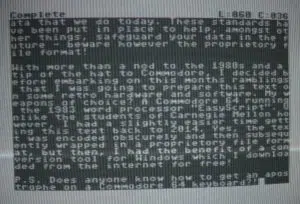In the news last week was the discovery of 28 digital works of art created by the late artist Andy Warhol as part of a commission for the 1985 launch of the Commodore Amiga (remember those?). The discovery was the culmination of a three year project to recover the contents of files found on floppy disks once belonging to Warhol.
Why did this project take so long though? Well firstly, the age of the disks meant that special techniques had to be used to extract the data without risking any damage to the media itself, but this in turn unearthed a greater challenge; how to make sense of the data recovered? Warhol used a long forgotten Amiga art package called GraphiCraft which, common to software of the era, used its own proprietary file formats to store created images (the now ubiquitous JPEG standard wasn’t going to be issued for another 7 years). Only months of painstaking reverse engineering of this format by members of the Carnegie Mellon University Computer Club finally enabled these images to see light of day again after nearly 30 years.
The question has to be asked therefore that if data from only 30 years ago required this much effort to relinquish its secrets, how safe is your data going to be in a similar period of time from now? In looking for an answer do remember that 30 years ago, we didn’t have the standards for the storage and interchange of data that we do today. These standards have been put in place to help, amongst other things, safeguard your data in the future – beware however the proprietary file format!

With more than a nod to the 1980s and a tip of the hat to Commodore, I decided before embarking on this months ramblings that I was going to prepare this text on some retro hardware and software. My weapons of choice? A Commodore 64 running the 1983 word processor “EasyScript”. Unlike the students of Carnegie Mellon however, I had a slightly easier time getting this text back to 2014. Yes, the text was encoded obscurely and then subsequently wrapped in a proprietary file format, but then, I had the benefit of a conversion tool for Windows which I downloaded from the internet for free!
P.S. Does anyone know how to get an apostrophe on a Commodore 64 keyboard?!